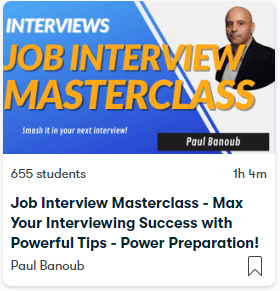
Job interviews can be nail-biting for many people. The prospect of meeting a potential employer and convincing them that you are the right candidate for the job can seem daunting. However, with some preparation and practice, you can approach your job interview with confidence and succeed in landing your dream job. In this comprehensive guide, you will be provided with job interview tips and strategies to help you ace your next interview.
Job Interview Etiquette:
Job interviews can be nerve-wracking, but following proper etiquette can help to make the process smoother and increase your chances of success. Etiquette is all about presenting yourself as a professional, respectful, and thoughtful candidate. Here are some tips to follow for job interview etiquette:
Dress Appropriately: Dressing appropriately is the first step in presenting yourself as a professional. Dress in business attire, make sure your clothes are clean and well-fitting and avoid flashy or distracting accessories.
Be Punctual: Being on time for an interview shows that you respect the interviewer's time and that you are reliable. Arrive at least 10 minutes early, so you have time to check in and compose yourself.
Greet the Interviewer: Greet the interviewer with a firm handshake and a smile. Address them by their name, and if you are unsure about the pronunciation, ask them to repeat it.

Be Polite and Respectful: During the interview, be polite and respectful to everyone you encounter, from the receptionist to the interviewer. This shows that you are a team player and that you have excellent communication skills.
Use Appropriate Language: Avoid using slang, profanity, or inappropriate language during the interview. Speak clearly and confidently, and use proper grammar and sentence structure.
Listen Carefully: Carefully listen to the questions of the interviewer and before answering your questions, take the time to think. This shows that you are thoughtful and attentive.
Ask Thoughtful Questions: At the end of the interview, ask thoughtful questions about the company or the position. This will show the interviewer that you have done your research and you are keenly interested in this job.
Thank the Interviewer: After the interview, thank the interviewer for their time and consideration. Send a follow-up email or note thanking them for the opportunity to interview.
Following proper job interview etiquette can make a significant difference in the outcome of the interview. It can help to make a positive impression on the interviewer and increase your chances of being hired. Remember to be professional, respectful, and thoughtful throughout the process.
How to Impress in a Job Interview
Impressing your potential employer during a job interview can be a key factor in securing the job you want. While the interview process can be nerve-wracking, there are several things you can do to present yourself in the best possible light and stand out from other candidates. In this section, we will discuss some tips and tricks to help you impress in your job interview.
Research the Company
One of the most important things you can do before your interview is to research the company you are applying to. This will not only help you to understand the company's mission, values, and culture but also to tailor your answers to the company's needs. Take some time to review the company's website, social media accounts, and any recent news or press releases.
Dress Appropriately
Your attire can also make a big difference in how you are perceived during your interview. Make sure to dress appropriately for the position you are applying for and the company's culture. If you are not sure about their culture, it is always better to make mistakes on the side of caution and dress more conservatively. Remember, you want to look professional and put together.
Be Prepared
Make sure to arrive at your interview on time and with everything you need, such as copies of your resume, references, and any other relevant documents. Being prepared will show that you are organized, detail-oriented, and respectful of the interviewer's time.
Practice Your Answers
While you cannot predict every question that will be asked during your interview, certain questions are almost always asked, such as "Tell me about yourself" and "What are your strengths and weaknesses?" Before the interview, you need to practice the answers you've prepared to these questions, as well as any other questions you think may be relevant. This will help you to feel more confident and prepared during your interview.
Show Enthusiasm and Interest
Every employer wants to hire somebody who is more enthusiastic about the position and the company. Make sure to show your interest by asking questions about the company, the position, and any other relevant topics. This will not only demonstrate your enthusiasm but also your ability to engage with others and take initiative.
Use Positive Body Language
Your body language can also make a big impact during your interview. Make sure to maintain eye contact, sit up straight, and use appropriate gestures when speaking. This will help you to appear confident, engaged, and interested.
Follow Up
After your interview is done, follow up with a thank-you email. This will show that you are respectful, courteous, and interested in the position. It is also a good opportunity to reiterate your interest in the position and the company.
Impressing in a job interview requires preparation, enthusiasm, and attention to detail. By researching the company, dressing appropriately, being prepared, practicing your answers, showing enthusiasm and interest, using positive body language, and following up, you can present yourself in the best possible light and increase your chances of securing the job you want.
Body Language for Job Interviews
Body language is an important factor in job interviews. Here are some tips for you:
Make eye contact: When you first meet the interviewer, make eye contact and smile. This way, the interviewer will find that you are friendly and confident.
Sit up straight: Slouching can give the impression that you are not interested or engaged in the conversation. Sit up straight and lean slightly forward to show that you are attentive.
Use hand gestures: Using hand gestures can help you to emphasize your points and show enthusiasm.
Avoid fidgeting: Fidgeting can be distracting and make you appear nervous. Try to keep still and avoid playing with your hair or clothes.
Job Interview Strategies for Success
Preparing for a job interview can be a nerve-wracking experience, but having the right strategies in place can help you approach the interview with confidence and increase your chances of success. Here are some job interview strategies to consider:
Research the company and the job position
Before the interview, do some research on the company and the job position you are applying for. This can help you understand the company culture, values, and mission, as well as the job responsibilities and requirements. This information can help you tailor your responses to the interviewer's questions and demonstrate your knowledge and enthusiasm for the position.
Practice common interview questions
Practicing the answers to common interview questions with your friends or family members can help you feel more confident and prepared when you are in the interview room. You can also review common interview questions online and prepare responses that highlight your skills, experience, and qualifications.
Dress professionally
Make sure you dress professionally for the interview. Dressing appropriately shows that you respect the interviewer and take the opportunity seriously. Make sure your dress is clean, well-ironed, and fits you well.
Arrive on time
You must always arrive at least 10-15 minutes before the actual interview time. This shows that you are punctual and dependable. If you arrive too early, wait in your car or a nearby coffee shop until it's closer to the interview time.
Use confident body language
During the interview, use confident body language. Sit up straight, maintain eye contact, and use appropriate gestures when speaking. Avoid slouching, fidgeting, or crossing your arms, as this can indicate nervousness or lack of confidence.
Show enthusiasm and interest
Express enthusiasm and interest in the job position and the company. Ask thoughtful questions about the job responsibilities, company culture, and career growth opportunities. This shows that you are genuinely interested in the position and are motivated to succeed.
Follow up after the interview
After the interview is done, you should send a follow-up email or thank-you note to the interviewer. This can help you stand out from other candidates and demonstrate your professionalism and appreciation for the opportunity.
In summary, a successful job interview requires thorough preparation, confidence, and professionalism. By researching the company and job description, practicing your responses to common interview questions, and demonstrating enthusiasm and professionalism during the interview, you can increase your chances of success. Remember to also evaluate the company during the interview process, and ask questions that will help you determine if it's the right fit for you. Good luck!
